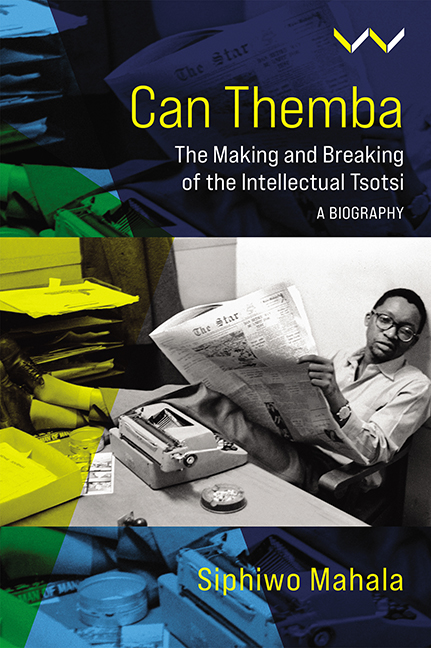Book contents
- Frontmatter
- Dedication
- Epigraph
- Contents
- List of Illustrations
- Acknowledgements
- Introduction
- PART I Death and Birth of a Scribe
- PART II ‘Live Fast and Die Young’
- PART III The ‘Intellectual Tsotsi’
- PART IV Dances with Texts: Writing and Storytelling
- PART V A Writer’s Immortality
- Postscript: The Three Burials of Can Themba
- Notes
- Bibliography
- Index
1 - A Knock on the Door
Published online by Cambridge University Press: 26 May 2022
- Frontmatter
- Dedication
- Epigraph
- Contents
- List of Illustrations
- Acknowledgements
- Introduction
- PART I Death and Birth of a Scribe
- PART II ‘Live Fast and Die Young’
- PART III The ‘Intellectual Tsotsi’
- PART IV Dances with Texts: Writing and Storytelling
- PART V A Writer’s Immortality
- Postscript: The Three Burials of Can Themba
- Notes
- Bibliography
- Index
Summary
We were those sensitive might-have-beens who had knocked on the door of white civilisation (at the highest levels that South Africa could offer) and had heard a gruff ‘No’ or a ‘Yes’ so shaky and insincere that we withdrew our snail horns at once.
Can Themba — Requiem for Sophiatown (2006), 57He knocked on the door. There was no response. He knocked again, and listened. All was quiet. He tried to turn the doorknob and push the door open. It was locked from the inside. He knocked once more, harder this time. Nothing. He pressed his ear against the wooden door. Silence.
With one eye closed, he peeped through the keyhole. He could make out a lanky man lying in bed with his feet pointing heavenwards. It was definitely the man he was looking for. Why on earth was he not opening? He banged on the door with his fist, shouting his name: ‘Bra Can! Bra Can Themba!’ No response. He hammered on the door. Silence
It was Friday, 8 September 1967. The 25-year-old Pitika Ntuli had travelled all the way from Lubombo, a journey of about 25 kilometres, to Manzini in Swaziland (now the Kingdom of eSwatini), where his mentor rented a flat. At the time Can Themba – full name Daniel Canodoce Themba, also known as Dorsay – was a teacher at St Joseph's Catholic Mission School in Umzimpofu, about five kilometres outside Manzini. He often hosted young men in search of knowledge and intellectual stimulation.
Now Ntuli's friend, Bicca Maseko, suggested that they go watch a film at the bioskop (cinema) and come back later. It was a Friday afternoon, and the schools had closed for the September holidays. Teacher Can Themba had probably drunk a little too much, a littletoo early, and had passed out, Maseko reasoned. With little choice, Ntuli concurred, and left reluctantly. He kept looking over his shoulder as they walked away, hoping that the door would fly open.
Ntuli, a young South African student exiled in Swaziland, was intending to visit the man who had been his role model and mentor since higher primary school days. Growing up in Witbank (now eMalahleni) in the former Eastern Transvaal (now Mpumalanga Province), Ntuli often visited Sophiatown, a culturally and politically vibrant township in Johannesburg, during holidays and over some weekends.
- Type
- Chapter
- Information
- Can ThembaThe Making and Breaking of the Intellectual Tsotsi, a Biography, pp. 11 - 19Publisher: Wits University PressPrint publication year: 2022

